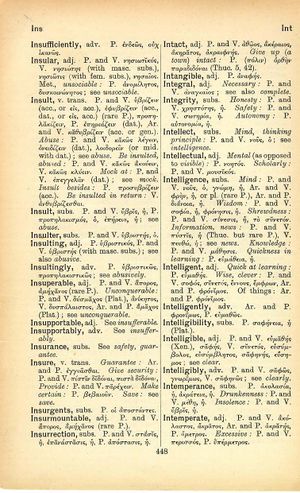insult
οὐκ ἐπιλογιζόμενος ὅτι ἅμα μὲν ὀδύρῃ τὴν ἀναισθησίαν, ἅμα δὲ ἀλγεῖς ἐπὶ σήψεσι καὶ στερήσει τῶν ἡδέων, ὥσπερ εἰς ἕτερον ζῆν ἀποθανούμενος, ἀλλ᾿ οὐκ εἰς παντελῆ μεταβαλῶν ἀναισθησίαν καὶ τὴν αὐτὴν τῇ πρὸ τῆς γενέσεως → you do not consider that you are at one and the same time lamenting your want of sensation, and pained at the idea of your rotting away, and of being deprived of what is pleasant, as if you are to die and live in another state, and not to pass into insensibility complete, and the same as that before you were born
English > Greek (Woodhouse)
v. trans.
P. and V. ὑβρίζειν (acc., or εἰς, acc.), ἐφυβρίζειν (acc., dat., or εἰς, acc.) (rare P.), προπηλακίζειν, P. ἐπηρεάζειν (dat.). Ar. and V. καθυβρίζειν (acc. or gen.). abuse: P. and V. κακῶς λέγειν, ὀνειδίζειν (dat.), λοιδορεῖν (or mid. with dat.); see abuse. be insulted, be abused: P. and V. κακῶς ἀκούειν, V. κακῶς κλύειν. mock at: P. and V. ἐπεγγελᾶν (dat.); see mock. insult besides: P. προσυβρίζειν (acc.). be insulted in return: V. ἀνθυβρίζεσθαι. subs. P. and V. ὕβρις, ἡ, P. προπηλακισμός, ὁ, ἐπήρεια, ἡ; see abuse.

